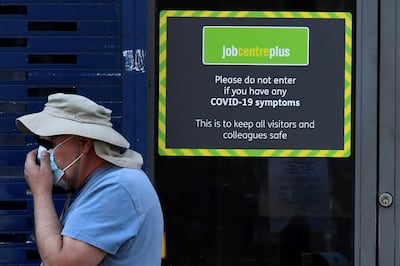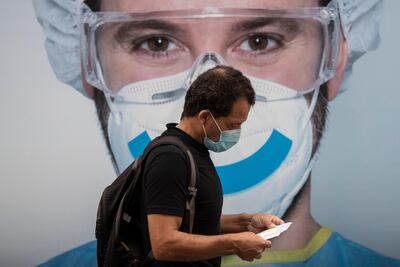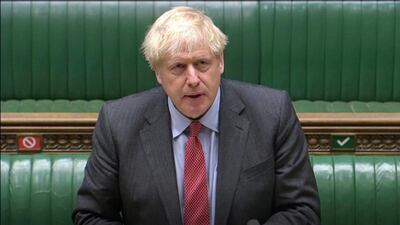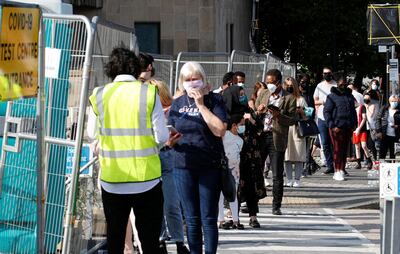British Prime Minister Boris Johnson on Tuesday clamped down on the soaring number of coronavirus cases in his country by bringing in strict new restrictions to slow the outbreak.
Britain recorded another 4,926 new cases today, the highest daily figure since May 7, and taking the UK's overall number of infections above 400,000. There were 37 deaths recorded, the highest since July 14.
Addressing MPs in Parliament, Mr Johnson said that pubs, bars and restaurants throughout England will be forced to close at 10pm BST from Thursday, and people have been told to work from home again if they can.
Although the measures do not go as far as a total shutdown, the curfews will not be welcomed by the hospitality industry, which has already been heavily hit by the pandemic.
Mr Johnson warned that it would be complacent to believe the virus was not here to stay.
"It is that kind of complacency that could be our undoing," he warned.
"If we fail to act together now we will not only place others at risk, but jeopardise our own future with the drastic action that we will be forced to take."
"No British government would wish to stifle our freedoms in the way we have had to this year," he added, before saying that Britain could find comfort in the fact it has re-opened schools and the "vast majority of the UK economy can move forward".
Under the new rules, people who work in retail, hospitality and private car hire all need to wear face coverings in England.
He also said the phased return of business conferences, exhibitions and sporting events will now not be able to begin as planned from October 1.
Several pilot test events for sports stadiums, in which capacities have been capped at 1,000 people, have taken place and it was hoped venues would be allowed to welcome more spectators from the start of next month, but Mr Johnson said that those plans must now be postponed.
"This is moment where me must act. If we can curb the number of daily infections and reduce the reproduction rate to 1 we can save lives, protect the most vulnerable and shelter the economy from the far sterner and more costly measures that will become inevitable later on," Mr Johnson said.
He warned that the new measures will be in place for six months, unless palpable progress was made in finding a vaccine or treatment to Covid-19.
The prime minister stressed that the new measures were "by no means a return to the full lockdown of March".
Mr Johnson will make a televised address to the nation at 8pm to update the public on the drastic new measures.
He added that other countries within the UK were taking similar steps to curb the virus.

Only yesterday, the chief medical officers for England, Northern Ireland, Scotland and Wales raised the level from three to four, meaning a high or rising level of transmission requiring enforced social distancing.
Several areas in the north of England, as well as in Scotland and Wales, have gone into local lockdowns after seeing a spike in infections. London Mayor Sadiq Khan told Sky News on Tuesday that he is proposing up to 15 more restrictions in the British capital, including most people working from home, masks being worn in public and limits on wedding and funerals.
Other European countries began imposing strict coronavirus restrictions this week after the continent started recording between 40,000 to 50,000 new infections a day.
The latest infection data for Europe, reported by the World Health Organisation, is a cause for concern as countries including France and Spain have seen an uptick in deaths after cases have risen back to levels not seen since the first peak of the pandemic in March.
Spain on Monday restricted access to parks and public areas around Madrid, where more than 850,000 people are infected, many in poor areas with higher immigrant populations. Like the British government, Spain will also limit gatherings to six.
Peaceful protests took place over the weekend in a third of the 37 districts in the capital hit by the new restrictions, but Prime Minister Pedro Sanchez agreed to counter unrest by sending in the army after a meeting on Monday with the regional governor, Isabel Diaz Ayuso.
The country has the highest number of coronavirus cases in Europe, with more than 671,000 infections recorded, according to the latest data from Johns Hopkins University. More than 30,663 people have died there from the virus, a lower figure than France and the UK, which have 31,346 and 41,877 deaths respectively.

From this week in France, the southern city of Nice is banning gatherings of more than 10 in public spaces and restricting bar opening hours. Last week, Marseille and Bordeaux imposed new restrictions after a high number of local cases were reported.
France reported 5,298 new infections on Monday, a drop from the 13,000 daily cases on September 18th and 19th. The recent surge in cases mostly affected the young in France, but infections are growing fast among the over-75s, the health agency said in its weekly update. Hospital admissions, including to intensive care units, are also rapidly rising.
Other European countries, including Ireland, Greece, Holland and Denmark, have imposed similar social restrictions to curb Covid-19.


